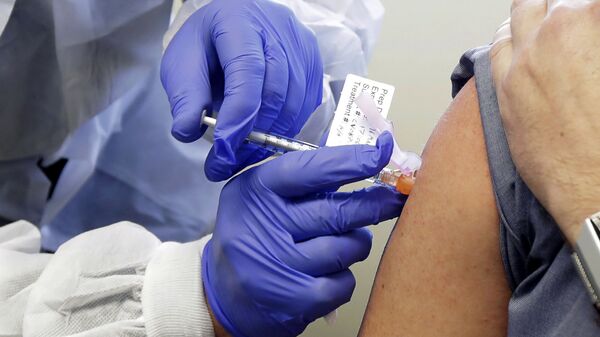With Moderna becoming the latest firm to reveal promising COVID-19 vaccine results, Scott Gottlieb, the former commissioner of the US Food and Drug Administration (FDA), stated Monday that the pandemic may “effectively” come to an end by next year.
Gottlieb, in an interview with CNBC morning show “Squawk Box,” said that if vaccine candidates from firms Pfizer and Moderna prove to be as effective as early data suggests, “we could effectively end this pandemic in 2021 with our technology.”
“If these full data sets hold, when the full data comes out, we may have two highly effective vaccines against COVID,” Gottlieb, who now serves on Pfizer’s board, stressed. He added that “sufficient” doses of the vaccines would have to be made available to the public for the pandemic to end.
Interim data analysis from Moderna revealed earlier Monday that the company determined that its vaccine candidate appeared to be 94.5% effective in preventing the spread of COVID-19, a feat that company CEO Stephane Bancel hailed as a “game changer.”
Moderna explained in a news release that its results were based on 95 confirmed cases of COVID-19 infection within its Phase 3 trial that involves some 30,000 participants. Of the cases, 90 COVID-19-positive individuals had been assigned to the placebo group, whereas the five others received the company’s two-dose vaccine.
The company’s vaccine results come on the heels of news from Pfizer that its own vaccine candidate was more than 90% effective. Similar to Moderna, Pfizer’s two-dose vaccine is an mRNA-based candidate that uses genetic material to trigger an immune response to SARS-CoV-2, the virus that causes COVID-19.
Although early data doesn’t specifically show that either company’s vaccine is preventing individuals from ever becoming infected with the respiratory disease, Gottlieb did state that both candidates would be effective in combating the virus’ spread.
“You have to presume, at these levels of efficacy that we’re seeing from these vaccines, the vaccines aren’t just reducing signs and symptoms of COVID disease, but they’re actually probably preventing some people from getting infected or maybe reducing the likelihood of people [shedding] the virus,” Gottlieb later noted.
“Hopefully, the data will show that. You have to believe that it will based on these levels of efficacy, but obviously we need to see the full datasets.”
Before either candidate is cleared for public distribution, both vaccines need to be greenlighted by the FDA for emergency use. However, US President Donald Trump indicated during a Friday update on Operation Warp Speed that Pfizer’s vaccine is anticipated to be ready for mass distribution by April 2021.
At present, over 54 million COVID-19 cases have been confirmed globally, with the death toll surpassing 1.3 million, according to data from Johns Hopkins University. The US alone accounts for over 11 million documented infections.
Although several candidates are still in trial phases, the first registered COVID-19 vaccine was Russia’s Sputnik V, which has been found to be 92% effective against the virus, according to recent interim analysis. Most recently, the World Health Organization stated that Sputnik V would be added to its list of recommended vaccines should it meet the agency’s criteria.

